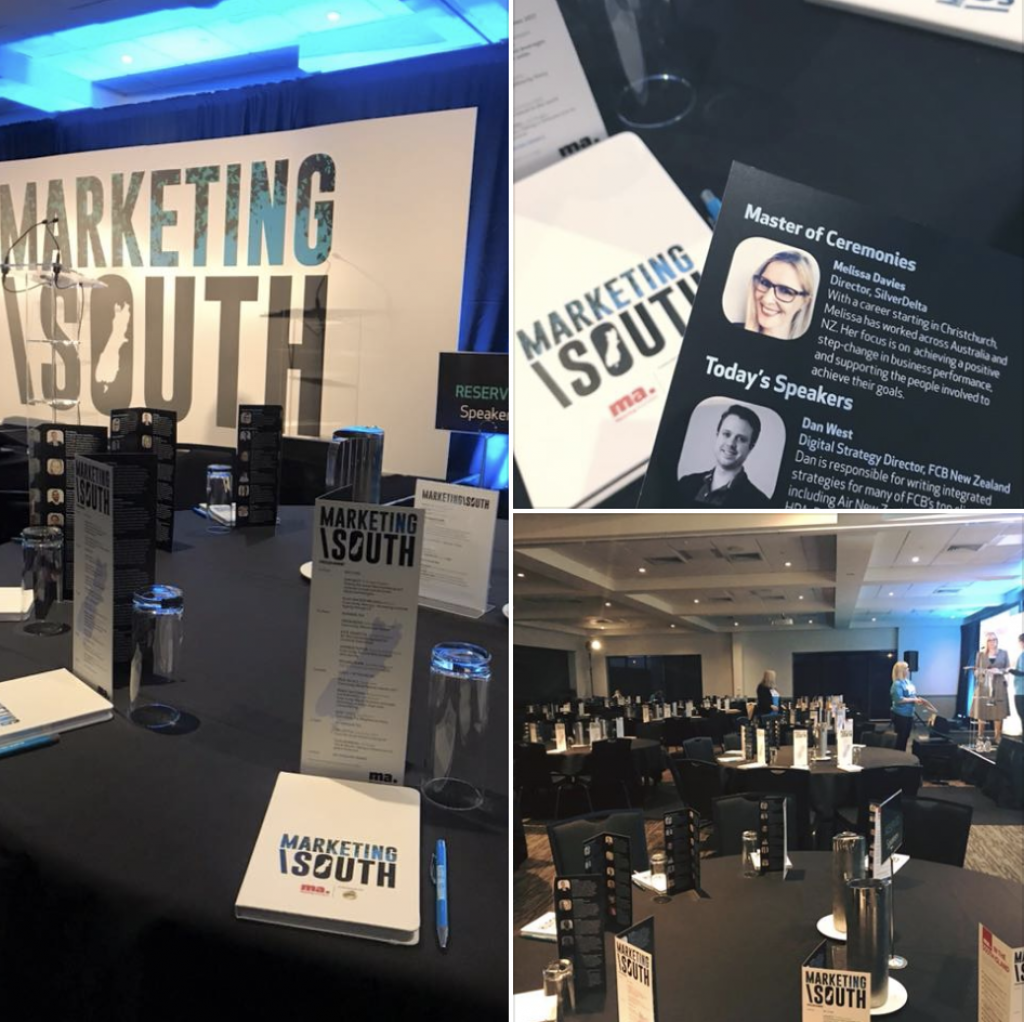It was also my first ever attempt at being an emcee (MC). Which, I’m proud to say, I survived! I didn’t trip, swear, mix people’s names up or miss my cue – so that feels like success!
At the end of the day, I was encouraged to do a short wrap up, so the approach I took was to share one key takeout from each of the incredible speakers.
Here’s the summary:
- Facebook use in NZ is increasing overall, we’re one of the highest users in the world per capita, but when you look at another trend, voice search, we’re well behind. Voice is on the rise and Dan used the ‘raw chicken moment’ to bring to life why you need to design voice search properly, it’s not about replicating a text search or touch experience. The moment refers to when you’re cooking a meal and have raw chicken on your hands and need to check the menu on your device. You don’t touch the device, you would use voice if you could – and what would you say?
- Elke and Kate reminded us of an essential equation. CX = BX = EX. Customer Experience = Brand Experience which is delivered through the Employee Experience.
- Mercury’s brand evolution is one that has been heavily focused on the customer, and Elke explained how they ‘walk the talk’ with a great example - the Executive team invited the customer base to choose the logo/brand, customer’s chose the bee, and that is the one that Mercury now have.
- Kate also talked about Air NZ’s ‘Customer Mission’ profiles – commute, visit or itinerary. These are different to customer personas and are more focused on the needs of the customer on each of these journeys (my take is this is more needs-based segmentation instead of more traditional demographic segmentation). Many of us will be each of these in a given period, and Air New Zealand focus on delivering a great customer experience for each one of these missions.
- Simon introduced a new concept to many of us, that of a Marketing Board. This is different to their Governance Board, and they meet monthly to review marketing strategy, customer and market insights, and product.
- Andrew shared the journey for the 100% Pure NZ brand and the complexity of marketing when you have no ‘product’ to sell! He emphasised the power of partnerships in doing so – a digital partner to gain deep audience insight, and a commercial tourism partner to enable people to act, and actually come to NZ.
- The Masters Games in Auckland were a huge success, and Paul discussed how the use of intelligent data and marketing automation lead to that. He shared a tip that when using marketing automation, the initial sign up form needs to be ‘lite’ to encourage registration but by having a detailed ‘profile’ section for people to update, you can encourage this and acquire useful intelligence about your audience.
- Penny and Achan talked about the power of a great agency/client relationship, and discussed how articulating the bottom line impact is essential when seeking C-suite or Board sign off for new software, marketing or tools. Revenue attribution is essential when using marketing automation tools to enable you to do so ongoing, and also to fine-tune your efforts.
- Neighbourly’s story was one that reminded us all to ensure there’s a budget to market any new product, service or site, not to put all the budget into building the ‘thing’. Kent shared how, due to a limited budget, they’d worked hard to try and test a variety of things, and leveraged and borrowed proven ideas from others to grow – he didn’t use these exact words, but the sentiment was ‘steal with pride’!
- To a room full of (mostly) South Islanders, Tim’s advice to embrace being from a small part of the world, especially one so stunning, was well received. As were the ‘war stories’ he talked us through, with the key takeout being: be sure to test your ‘proven’ model when moving into new markets or geographies, what worked ‘here’ may not work ‘there’.
- The final speaker of the day was Todd Barberel, who tugged the heart strings with a raw video of the All Blacks on the field and doing the haka, led by Taine Randall and featuring Justin Marshall, Tana Umaga etc. Quite confronting when he explained that footage was 20 years old! And also that this, this imagery and emotion, the haka and ‘the jersey’ is the how the All Blacks’ brand is perceived by global audiences. He explained that the All Blacks are in the same league as other sporting giants the F1 and New York Yankees, but they want to be more than that. The team is the star, not the individual, and that’s across all our elite rugby teams like the Black Ferns, and Sevens. Like Andrew, partnerships have and will be, instrumental, and finding commercial partners with values alignment, reach and capability, is essential, along with positive commercial terms of course, but Todd explained that is what comes secondary as they must protect the brand equity.
The calibre of speakers was outstanding, and there were some key themes from the day:
- Data-driven decision making is essential at every stage and level of marketing.
- Measurement and real-time results should be used to plan, implement and evolve campaigns.
- We need a deep understanding of customer’s needs, and experiences.
- Organisations as a whole must be engaged in the customer experience to really deliver a stand-out experience.
- Refreshed or new brands can happen quickly, but a new or improved brand that requires a new culture, to one that truly has the customer at the core, takes a long time to build (2-4 years from the examples given).
I did use this wrap up to share something I’m passionate about, actually, it was l more like a plea for help. I am disappointed at the calibre of Governance conversations around marketing and sales – if they happen at all. Marketing and Sales drive the top line of any business, and a Board’s role is to improve shareholder value, so why are these two, rapidly changing areas, being excluded? In fact, at the Institute of Director’s Company Directors Course – neither receive any air time at all. None. Five full days, thousands of dollars spent to attend, and no discussion about growth, sales or marketing. My call to each person in the room was to leave Marketing South with the gems of wisdom and sparks of brilliance that were ignited today and DO something with them.
Share them, implement them, have new conversations.





